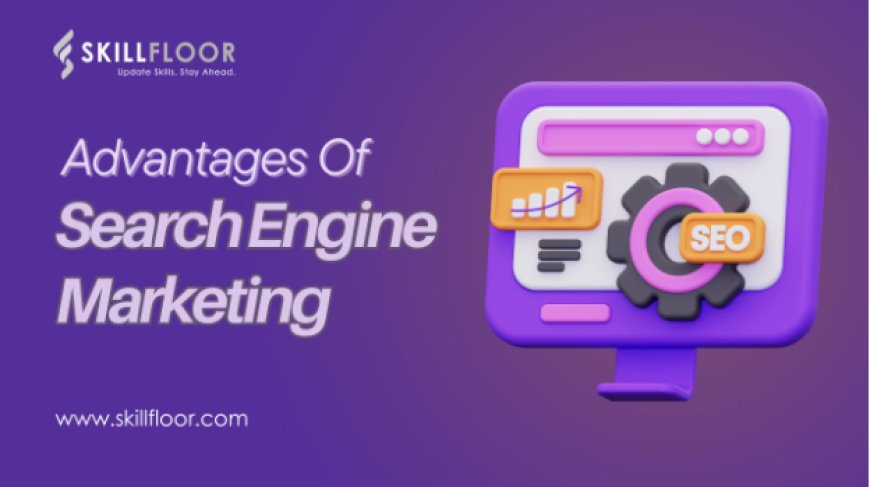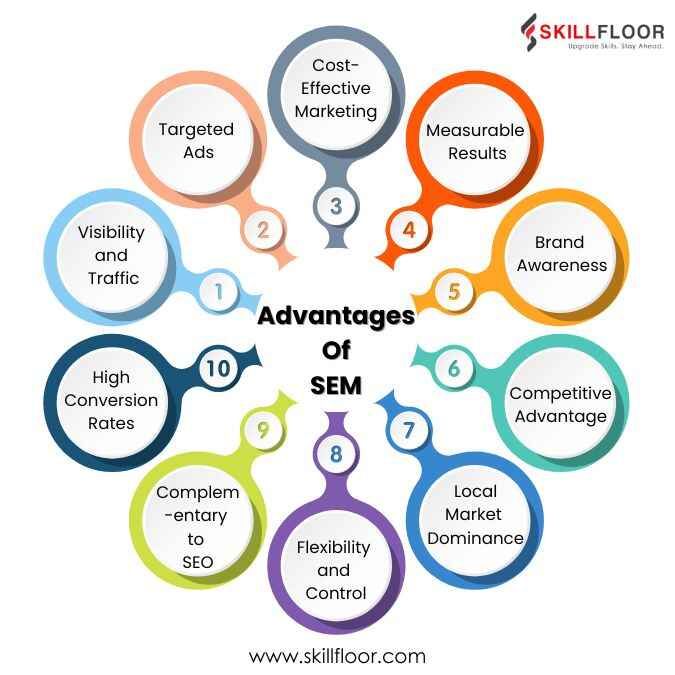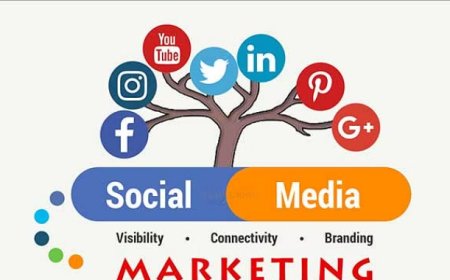Top Advantages of Search Engine Marketing for Your Business
Discover the top benefits of Search Engine Marketing for your business. See how SEM can boost your online visibility, attract the right audience, and increase sales.

In the present competitive digital marketing, Search Engine Marketing (SEM) stands out as an effective technique for increasing your company's online visibility and driving targeted visitors. SEM enables businesses to reach potential clients who are actively looking for their products or services by using paid adverts on search engines. This type of digital marketing not only boosts visibility but also improves brand familiarity, making it an essential approach for organizations looking to flourish in the digital world.
One of the key advantages of Search Engine Marketing is its ability to deliver immediate results. Unlike organic search engine optimization (SEO), which can take months to show significant impact, SEM campaigns can be launched quickly and start generating traffic almost instantly. This speed to market is critical for organizations that want to capitalize on time-sensitive opportunities or promote limited-time deals. Furthermore, SEM gives businesses precise control over ad budgets, targeting options, and performance tracking, allowing them to optimize their campaigns for optimum return on investment.
SEM provides unequaled targeting capabilities, allowing firms to target specific demographics, geographic areas, and even user behaviors. This precision guarantees that marketing efforts are targeted to the most relevant demographic, boosting the likelihood of conversions and lowering ad spend. Businesses can achieve growth and success by combining the strategic advantages of Search Engine Marketing with other digital marketing methods such as content marketing and social media advertising.
Top Advantages
1. Instant Visibility and Traffic
Unlike organic search engine optimization (SEO), which might take months to produce results, SEM offers immediate visibility. Once your ad campaign is live, your website will appear at the top of search results, resulting in quick traffic. This is especially useful for fledgling firms that require immediate exposure.
2. Targeted Advertisements
SEM enables you to target your advertisements based on certain keywords, demographics, geographic locations, and even time of day. This level of specificity ensures that your adverts reach the intended audience, which increases the possibility of conversion. For example, a local bakery can target clients who search for the "best bakery near me" in their city.
3. Cost-Effective Marketing
SEM gives you control over your budget. You can set daily or monthly ad spend restrictions, so you only pay when someone clicks on your ad (PPC). This cost-per-click (CPC) approach makes SEM a more cost-effective alternative because you are paying for actual interaction rather than just impressions.
4. Measurable Results
One of the most notable advantages of SEM is the ability to track and analyze campaign performance. Google Ads, for example, offers granular insights into data like click-through rates (CTR), conversion rates, and return on investment (ROI). This data helps you to continuously adjust your campaigns for greater performance.
5. Enhanced Brand Awareness
Even if visitors do not click on your advertising, the simple presence of your company at the top of search results can greatly increase brand recognition. Repeated exposure to your brand can build trust and recognition among potential customers.
6. Competitive Advantage
In competitive marketplaces, SEM can provide a significant advantage. By bidding on relevant terms, you can outperform competitors that just rely on organic search. This benefit is especially noticeable in businesses with intense competition, where being on the first page of search results is critical for gaining clients.
7. Local Market Dominance
SEM works especially well for firms that rely on local clients. Localized SEM campaigns can target specific geographic areas, allowing businesses to dominate their local markets. Google Ads' location extensions, for example, can help you reach out to more local clients.
8. Flexibility and Control
SEM campaigns provide unparalleled versatility. You may quickly change your advertising, keywords, and budgets in reaction to market changes or company requirements. This adaptability enables real-time optimization, ensuring that your marketing efforts remain consistent with your objectives.
9. Complementary to SEO
While SEM yields rapid results, it also supplements long-term SEO methods. Running SEM advertisements alongside SEO efforts allows you to obtain both short-term and long-term visibility. This dual approach maximizes your internet presence while also driving long-term growth.
10. High Conversion Rates
SEM targets users who are actively looking for items or services comparable to yours, increasing the possibility of conversions. These users are already in a purchasing mindset, so they are more likely to take action, whether it's making a purchase, signing up for a newsletter, or contacting your company.

How to Implement an Effective SEM Strategy?
-
Keyword Research: Identify which terms your target audience is searching for. Use Google Keyword Planner to uncover relevant keywords with high search volume yet low competition. This ensures that your advertisements reach the intended demographic, increasing visibility and relevancy. Effective keyword research is the foundation of any successful SEM campaign.
-
Create Compelling Ads: Write engaging ad copy that grabs your audience's attention and motivates them to click. Make strong calls to action and emphasize the unique benefits of your products or services. The idea is to make your ad stand out while increasing user engagement. Compelling advertisements boost click-through rates and conversions.
-
Optimize Landing Pages: Make sure the landing pages to which your advertising link is optimized for conversions. This contains a clear call to action, useful content, and a user-friendly layout. A well-optimized landing page enhances the user experience and raises the likelihood of conversion. It ensures that visitors do the intended activity after clicking on your ad.
-
Set a Budget: Determine how much you're willing to spend on SEM campaigns. Begin with a minimal budget and progressively expand as you notice favorable outcomes. Setting a budget helps you control expenditures and make better use of marketing funds. Regularly assessing and changing your budget can improve ROI.
-
Monitor and Adjust: Regularly assess the performance of your efforts and make changes as needed. This involves optimizing ad wording, modifying keywords, and adjusting bids to maximize ROI. Continuous monitoring helps you determine what works and what doesn't. Making data-driven tweaks can help you enhance marketing effectiveness and get greater results.
Search Engine Marketing has many advantages for organizations seeking to improve their online presence, acquire qualified leads, and increase sales. From enhanced visibility and targeted advertising to measurable results and high ROI, SEM offers a powerful framework for digital business success. By utilizing the benefits of SEM, you can remain ahead of the competition, adapt to industry changes, and establish a strong and identifiable brand. Whether you are a small or large firm, including SEM in your marketing strategy can provide considerable and long-term benefits.





























































